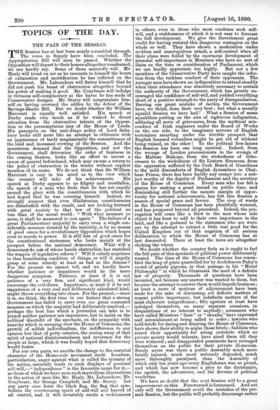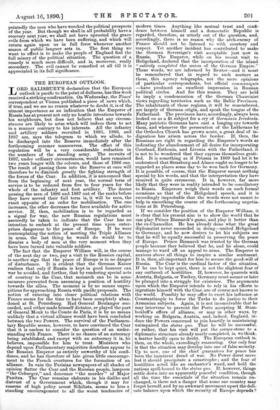TOPICS OF THE DAY.
THE PAIN OF THE SESSION.
THE Session has at last been nearly scrambled through. The votes in Supply have been concluded. The Appropriation Bill will soon be passed. Whether the Opposition will depart to their homes altogether unashamed, we can hardly say. Some of them assuredly will. Mr.
Healy will tread on air as he recounts to himself the hours of exhaustion and mortification he has inflicted on the Government. Mr. Labouchere will flatter himself that he did not push his boast of obstruction altogether beyond his power of making it good. Mr. Conybeare will indulge in virtuous self-complacency at the havoc he has made of Conservative designs. Mr. Storey will congratulate him- self on having crowned the edifice by the defeat of the Savings-Banks Bill. But we doubt whether Sir William Harcourt is equally well satisfied. His speech at Derby reads very much as if he wished to divert attention from the obstructive talents of the Opposi- tion to the presumptuous sins of the House of Lords. His panegyric on the anti-Jingo policy of Lord Salis- bury looks still more like an attempt to obliterate with an appearance of tardy magnanimity the remembrance of the loud and incessant crowing of the Session. And the monstrous demand that the Opposition, and not the Government, shall determine the order of business in the coming Session, looks like an effort to invent a cau se of quarrel beforehand, which may excuse a return to the policy of obstruction in the winter without explicit mention of its name. We do not think that Sir William Harcourt is easy in his mind as to the view which the country will take of his achievements. His speech at Derby appears to us fidgety and crestfallen, the speech of a man who finds that he has not exactly earned the glory with the constituencies with which he had hoped that he was covering himself. Indeed, we strongly suspect that even Gladstonian constituencies are dissatisfied with the result, and are looking forward with great anxiety to that law of the political no less than of the moral world : " With what measure ye mete, it shall be measured to you again." The failure of a great Parliamentary majority to carry even a single con- siderable measure resisted by the minority, is by no means of good omen for a revolutionary Opposition which hopes soon to accede to power. It is still less of good omen for the constitutional statesman who looks mainly at the prospect before the national democracy. What will a democracy do out of whose hands obstruction has snatched the weapon of legislative reform ? Will it calmly acquiesce in that humiliating condition of things, or will it angrily grasp at some remedy at least as bad as the disease ? For the present we cannot tell, and we hardly know whether patience or impatience would be the more dangerous symptom. Patience, at least if it is not patience of a very firm and significant kind, would encourage the evil-doers. Impatience, at least if it be not impatience of a very cool and deliberately calculated kind, might throw everything into chaos. For the present,—since it is, we think, the first time in our history that a strong Government has failed to carry even one great contested measure on which the majority had deliberately resolved,— perhaps the best line which a journalist can take is to preach neither patience nor impatience, but to insist on the political discredit of the spectacle, on the sympathy with anarchy which is creeping over the House of Commons, the growth of selfish individualism, the indifference to any opinion but that of petty coteries, the oozing away of that spirit of national disinterestedness and reverence for the people at large, which it was fondly hoped that democracy would foster.
For our own parts, we ascribe the change to the essential character of the Home-rule movement itself. Localism, particularism, anger against what is called the tyranny of the nation, naturally tends to such displays of personal self-will,—" independence" is the favourite name for it,— as those of which we have seen such marvellous illustrations in the action of men like Mr. Healy, Mr. Labouchere, Mr. Conybeare, Sir George Campbell, and Mr. Storey. Let any party once hoist the black flag, the flag that sym- bolises the overweening spirit of self-will and hatred of all control, and it will invariably excite a recklessness in others, even in those who most condemn such self- will, and a recklessness of which it is not easy to forecast the full development. We give the Government great credit for having resisted this dangerous contagion on the whole so well. They have shown a moderation under reckless and unscrupulous attack, a self-control when all their plans were foiled by the enormous development of personal self-importance in Members who have no sort of claim on the time or consideration of Parliament, which we can hardly appreciate too highly. But not a few members of the Conservative Party have caught the infec- tion from the reckless conduct of their opponents. The younger men have shown an indisposition to attend steadily- when their attendance was absolutely necessary to sustain the authority of the Government, which has greatly en- couraged. the confidence of self-will, and yielded everything short of a positive triumph to the party of disorganisation. Barring one great mistake of tactics, the Government have, we think, done their very best ; but what a morally squalid Session we have had ! . What a Session of mean squabblers putting on the airs of righteous indignation,. adducing all sorts of grievances, from the mythical mis- conduct of Irish engineers under the Board of Works on the one side, to the imaginary sorrows of English teetotalers smarting under the terrible prospect that English licensed victuallers might be got rid of without being ruined, on the other ! To the political free-lances the Session has been one long carnival. Indeed, from the wrongs of London processionists to the wrongs of the Maltese Bishops, from the wickedness of tithe- owners to the wickedness of Sir Lintorn Simmons, from the oppression suffered by the Cork Board of Guardians to the mild discomforts of English dynamiters in Chat- ham Prison, there has been hardly any escape into a sub- ject worthy of the dignity of Parliament and the scrutiny of the House of Commons. Every man who has felt a genius for making a great inroad on public time, and diminishing still further the minute margin of oppor- tunity for national achievements, has felt this Session a, season of special grace and favour. The crop of weeds• in the House of Commons has been plentifully watered,. and has prospered beyond all precedent. Indeed, the pro- rogation will come like a blow to the men whose sole object it has been to add to their own importance in the land, and like a godsend to the statesmen who are worn out by the attempt to extract a little real good for the United Kingdom out of that negation of all serious deliberation to which the House of Commons has at last descended. There at least the tares are altogether choking the wheat. We doubt whether the country feels as it ought to feel the full pain of this spectacle of political power deliberately wasted. The time of the House of Commons has resem- bled the heap of grain quarrelled for by Archdeacon Paley's crowd of greedy pigeons, in that passage in his " Mora/ Philosophy" in which he illustrates the need of a definite law of property. Thousands of questions have been invented, not because any answer was wanted to them, but because the attempt to answer them would impede business ; at least a score of motions of adjournment have been made for the sake of discussing, not definite matters of urgent public importance, but indefinite matters of the most elaborate insignificance ; fifty egotists at least have indulged themselves, on many separate occasions, in disquisitions of no interest to anybody ; screamers who have called Ministers " liars " or " skunks," have expressed naif astonishment at being called to order ; lawyers who hold briefs for dazing and dizzying the House of Commons, have shown their ability to argue those briefs ; faddists who seized their opportunity for airing crotchets which no private society would tolerate, have aired them till they were withered ; and disappointed pessimists have revenged themselves on the public for their private ill-success. Surely never was there a public Assembly much more fatally injured, much more seriously degraded, much more thoroughly paralysed, than the Assembly of which only ten years ago every Englishman was so proud, and which has now become a prey to the doctrinaire, the egotist, the adventurer, and the devotee of political vendettas.
We have no doubt that the next Session will be a great improvement on this. Forewarned is forearmed. And not only will the Government avoid the mistakes of the pre- sent Session, but the public will probably discourage rather pointedly the men who have wrecked the political prospects of the year. But though we shall in all probability have a recovery next year, we shall not have uprooted the grave evils from which we have been suffering, and which will return again upon us in full force whenever another season of public languor sets in. The first thing we want to effect is to make the people of England feel the full misery of the political situation. The question of a remedy is much more difficult, and is, moreover, really secondary. The evil cannot be remedied at all till it is appreciated in its full significance.



































 Previous page
Previous page